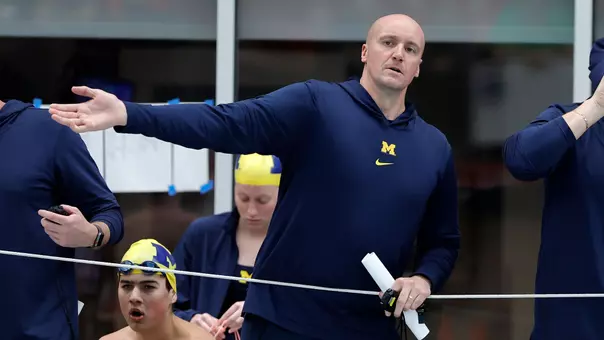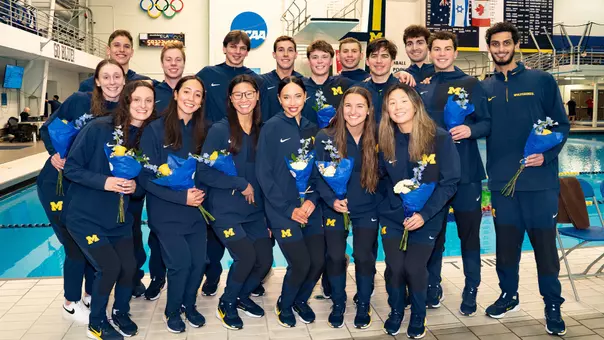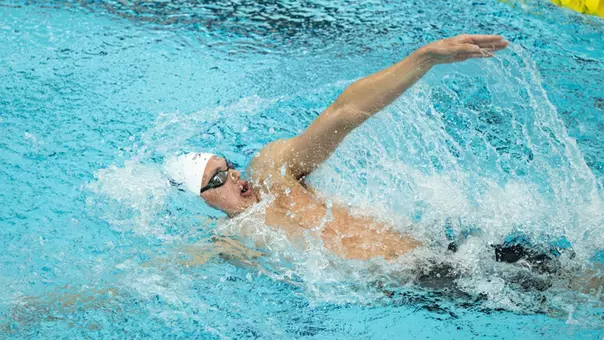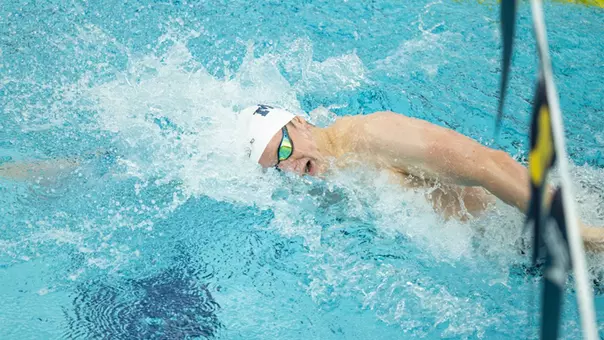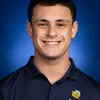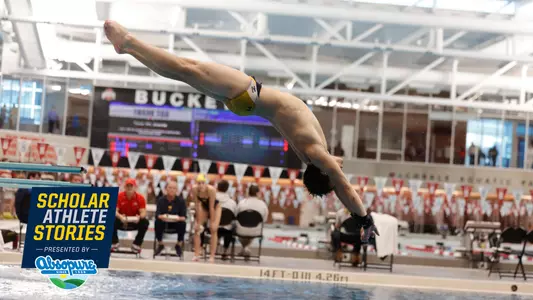
Scholar Stories: Liberman Finds Best of Both Worlds at U-M in Diving, Neuroscience
5/23/2024 11:41:00 AM | Men's Swimming & Diving
Continuing the series that began in 2016-17, each week MGoBlue.com will highlight a Michigan student-athlete and their academic pursuits. These are our Scholar-Athlete Stories, presented by Absopure.
By David Woelkers Jr.
The life of a pre-medical student and the life of a Division I student-athlete to the average person may seem like diametrically opposed experiences -- both require an intense devotion to their crafts, in a way that may seem nearly impossible to excel in both at the same time.
However, University of Michigan junior men's diver Kameron Liberman is having the best of both worlds; mixing his passion of diving and a dream of going to medical school to make the most of his collegiate experience.
For Liberman, there has never been a time he can remember where he did not aspire to practice medicine, but the specifics of what major he wanted to pursue before medical school were a far more recent aspiration.
"Medical school has always been my dream," Liberman said. "It was one of those things when they ask you as a kid what you wanted to do when you're older. For me, that was always to be a doctor but neuroscience was actually just right before I came to Michigan. It was actually, I think, when I was filling out my application.
"Throughout high school, I realized that I also really enjoyed psychology, and I kind of wanted to find a way to mix the two, and I feel like neuroscience does that for me. I took a lot of psychology classes, and I learned a lot about psychology and behavior. And then I also learned about the biology that goes behind all those things. And to me, that's super cool."
Despite excelling in high school and focusing his prep studies on attaining his goal of becoming a doctor, Liberman was not immune to the challenges and trials that come with accomplishing it in college -- especially when also navigating his passion and talent for diving at the Division I level. When describing his challenges, Liberman noted a parallel between the two spheres in which he has found himself.
"There's a little bit of a competitive aspect, as there is with sports," Liberman admitted. "There's a lot of pressure to do well in everything when you're in college, especially as a pre-med student, so I had to figure out what I needed to do to be my best at everything that I did. That wasn't something that came right away; that's something that I kind of figured out along the way throughout freshman year, and it's something that I think now I'm pretty comfortable with."
Expanding on his journey, Liberman pointed to the hurdles pre-medical students wholeheartedly dread.
"I guess the biggest challenge of being a student-athlete and a pre-med student has been in taking some of the quintessential hard pre-med classes, like organic chemistry, for example," Liberman said. "When they designed those classes, they weren't necessarily designed for someone who's not spending 20 hours a week doing them because of practices or competitions. So, you know, it could be tough to balance sometimes, but like I said, as long as I trust myself, I know how to study for classes and I know I can learn. And as long as I give myself the time to do that by planning everything out and communicating with my coaches, my coaches have been very understanding about things like that as well. By doing all of that, I know that I put myself in a good position to do well in my classes."

As part of his studies in neuroscience outside of the pre-medical lens, Liberman spent his junior year assisting in the research of Dr. Joanna Spencer-Segal, a researcher for the Michigan Neuroscience Institute and clinical provider at Michigan Medicine. Recalling his experience in Dr. Spencer-Segal's lab, Liberman had enthusiastic praise for both his supervisor and the research he was able to participate in.
"Dr. Spencer-Segal -- she's super cool," Liberman said. "Her research lab focuses on the stress response and stress hormones. She actually has an MD-PhD, and works as an endocrinologist as well. So that was kind of the bridge between endocrinology and neuroscience. We were using mouse models to study the stress response, but they also, a little bit before I joined the lab, started working a little bit with object recognition. So, I was helping out with a project where we were introducing mice to new objects and seeing if we could find neurons that were being fired for specific objects over anything else in the brain. That was my introduction into the research world; I hadn't had any research experience before that, so that was a pretty cool thing to be a part of.
"As we found, we were just kind of running an elementary study. This was very new for our lab, but, yeah, that's something that can be used in future studies, and it could underlie some of how we identify and trigger the stress response. And just being able to learn and see the calcium imaging process, which was the method that we used, that was really cool."
Though Liberman does not see him going down the same MD-PhD route as Dr. Spencer-Segal, preferring to focus on being a practitioner rather than a researcher, the time in her lab has given him invaluable insight into branches of medicine he otherwise would not have considered.
"I've always tried to keep my mind open for specialties I might want to pursue one day," Liberman said. "Learning about all this stuff, about the stress hormones, and also just talking with Dr. Spencer-Segal about what she does and why she ended up in endocrinology, I've become really interested in that as a field that perhaps I might go into one day. I don't want to make any, you know, definitive decisions right now about my future, especially without having much experience with them, but yeah, that's definitely something that I want to look into now. I like how endocrinology deals with a wholesale look at health; you have to take into account the entire patient because every hormone is circulated throughout your body. That's something that I want to be able to do as a doctor --provide a holistic model for my future patients."
Entering his final year of college, Liberman expressed excitement at both the joys of senior year and further expanding his out-of-the-classroom experience that began in Dr. Spencer-Segal's lab.
"I'm looking forward to, uh, you know, being a senior here. I'm super excited about that," Liberman said. "But I'm also looking forward to starting to get some clinical experience, whether that's like shadowing a physician of some sort or being a medical assistant somewhere. I'm ready to go down that path of getting patient experience for when I end up in medical school."

